A Revolution in Dirt and Seeds: Answering @Sagescrub's Challenge on What We Can Do to Increase Our Food Sovereignty.
The identity of Australia is ostensibly tied to agriculture. The vision of a man astride a horse mustering cattle with an Akubra hat is iconic, speaking of a romanticised masculinity where white man tamed the wild terra nullius, whipping it into submission. So romanticised is the image of the pleasures of the bush and the men who wander there it has been the subject of poetry, most famously Paterson's 'Clancy of the Overflow', where the office man wishes he was under the stars like the drover Clancy:
In my wild erratic fancy visions come to me of Clancy Gone a-droving ‘down the Cooper’ where the Western drovers go; As the stock are slowly stringing, Clancy rides behind them singing, For the drover’s life has pleasures that the townsfolk never know.
And the bush hath friends to meet him, and their kindly voices greet him In the murmur of the breezes and the river on its bars, And he sees the vision splendid of the sunlit plains extended, And at night the wond’rous glory of the everlasting stars.
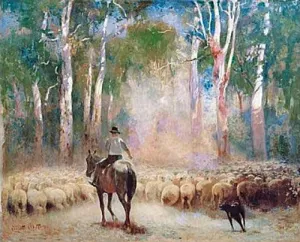
The Australian landscape gives meaning to the settlers and colonists drawing resources for this relatively new European nation. It was a thing to be overcome and tamed, and the men who did it were lauded as heroes. Still are, by all accounts - 'our farmers' battle drought and flooding rain to put food on the table of the nation.
Yet the taming of the nation has had terrible environmental consequences. Europeans introduced rabbits, cats and foxes, causing the extinction of native species. Hooved creatures compacted the soil, impacting the way rain soaks into the soil, silting up the rivers. Removal of vegetation to make way for wheat and other annual crops affected groundwater and increased soil salinity.
This lack of foresight and blindness is summed up beautifully by John Kinsella's poem 'Why they Stripped the Last Trees from The Banks of the Creek':
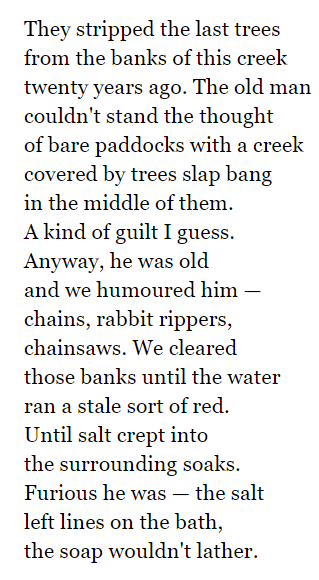
Much debate centres around how the land can be managed in more sustainable ways whilst still protecting the livelihood of farmers. It's gone beyond simple bailing out by the government into what next. Whilst they ignored the 'before', discounting Aboriginals as nomad savages, many are redressing this falsehood and exploring what Australia looked like before 1788. Bruce Pascoe's 'Dark Emu' argues that Indigenous Australians farmed, lived in villages, harvested grain and built aquaculture before Europeans. And it's to this that Australians need to look to figure out sustainable practices that allow for food sovereignty - farming isn't a heroic, noble preoccupation that has formed the centrepoint of Australian mythology for over 200 years - it's wanton destruction that is leaving us with a wasteland.
That's why images like this are also iconic:
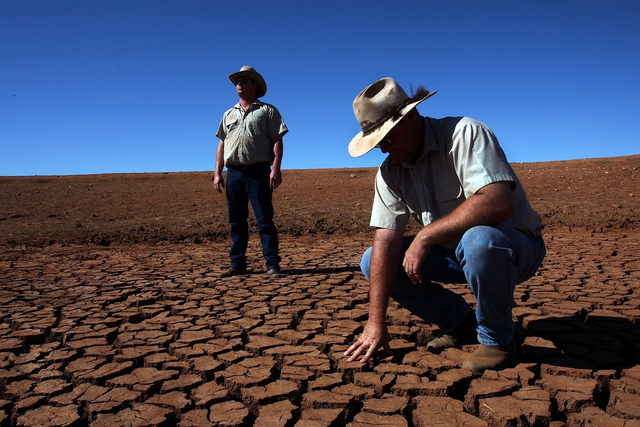
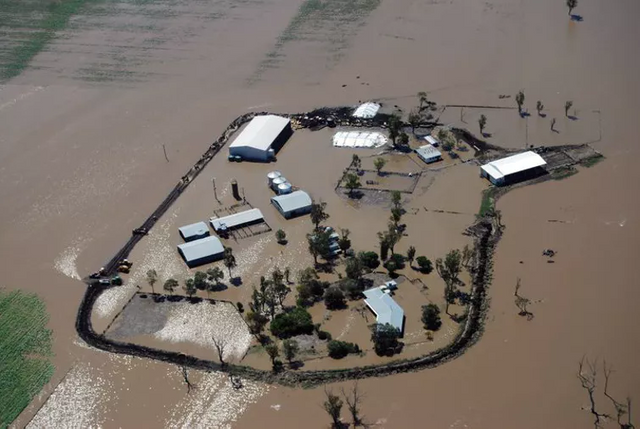
Many call for the adoption of indigenous food cultivation - not just here but worldwide - as an anathaema to Big Ag, adopting these ancient practices to consider new practices of crop rotation, companion planting, agroforesty and water collection. It's heartening to see this kind of thinking come out of the Australian landscape - whether it's too late or not is the question.
What do we do to counter the blindness of agriculture? If we can't do anything about such a huge system that's leading us toward an apocalypse, what do we do to gain food sovereignty for ourselves?
@sagescrub asked of us in this post this week:
What are you doing to claim food sovereignty for yourself or your community, and why?
A few years ago I started a Facebook group for my shire, centred around gardening and food production. I wanted to connect to people who might be growing food themselves and was hoping we could swap food and wisdom to be more independent of the supermarkets. It quickly became one of the biggest groups in the area, encompassing many towns and gaining over 2,000 people really quickly - far too quickly for me to manage. People were really interested in food sovereignty, whether it was for environmental reasons or for money, or just as a hobby. The barter system was incredible - bags of lemons swapped for bunches of basil, potatoes swapped for comfrey fertiliser. In the end, I just couldn't keep up the admin side of it and let it go in favour of a more localised group confined to my town and the one over, which has now grown to 200 people.
I live in a rural area that was once a big wool production area and at the edge of a wheatbelt too. There's a lot of farming folk around here, but there's also a lot of people with small acreages or at least big blocks of land where they have the capability of growing food for their own table. It's been fantastic to share inspiration, seeds, plants and knowledge, and we've been having monthly food swaps. So succesful has this been that the town over from us has started their own group and also do swap meets, and many members are in both groups. As much as I hate Facebook, these groups have been really empowering for many people.
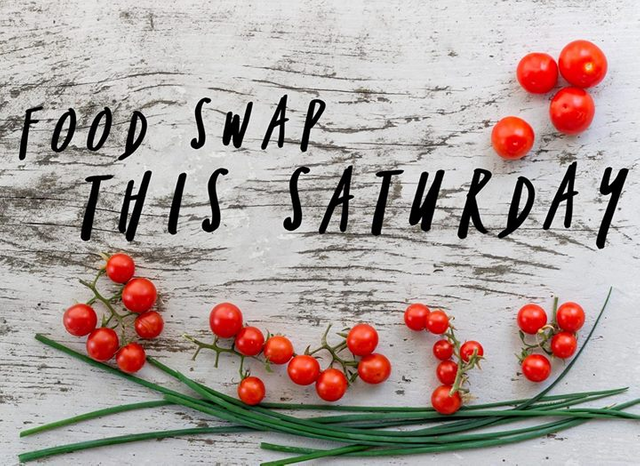
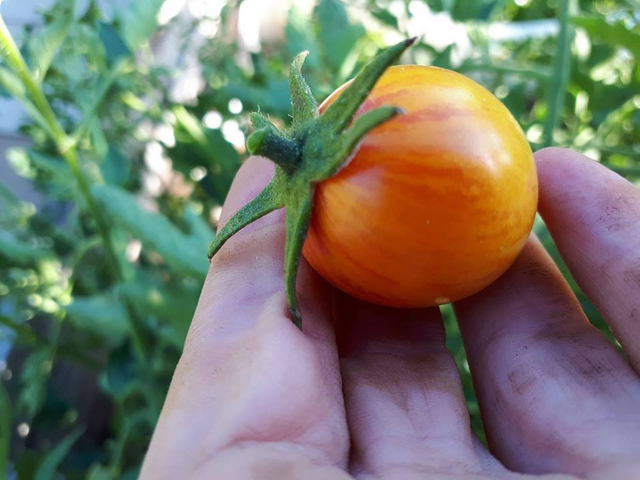
I think a comfrey plant from my patch is in about thirty gardens across the area and is used for fertiliser. That's pretty cool. Whenever I have excess produce, I list it on the site for free. I have the time, the energy and the enthusiasm and know how to grow more than I need and see it as an act of rebellion - with every meal made from my garden, I take pressure of the agricultural machines that are destroying my country. Every bit from a meal in my garden means that Big Pharma, Big Ag and Big Food.
It's a mini revolution in dirt and seeds.
And it's more than that - by being in charge of as much of our food as possible, we:
- refuse toxic ingredients in the form of pesticides
- nourish our bodies with real food, increasing our immune systems
- keep money in our pockets not in companies who just want to profit
- provide for ourselves so we won't go hungry in times of political turmoil
- help not only protect the environment, but nurture it locally.
We haven't been able to go too crazy with big crops as we don't have time due to work, and to be honest, grains aren't really a big part of our diet. Protein takes the form of eggs from our chickens or we barter when we can for milk to make cheese, when I fancy it. We don't eat a lot of meat, but have a friend who drops us off kangaroo, rabbit and sometimes venison for the freezer, and if we want other meat we buy it locally. I've learnt to dry or preserve most of our excess produce - cupboards full of preserved lemons, artichokes and tomato sauces are just beautiful mid winter and make me feel pretty clever. No way am I anywhere near @walkerland's self sufficiency but I think I could get there if I quit work - here's hoping! I know I can when it comes down to it - we're just lucky we don't have to quite yet. We just do what we can as much as we can.
I was rifling through old photos the other day and found this one - the humble beginnings of our place. I find it hilarious as we had no idea what we were doing. Our five acres was once used to run cattle and keep horses, but the soil was pretty good - no clay, thankgod - and just needed a lot of organic matter. Before we got the compost sorted out we were carting in a lot of horse, chicken, and alpaca manure from farms in the area. Now it's a jungle out there - I just went for a walk around the garden with my parents and felt pretty proud with just how much produce was coming out of the place - hops, rhubarb, nectarines, quinces, plums, apples, greens, zucchini, fennel seeds, eggs, honey, tomatoes, cucumber, grapes, potatoes, artichokes - the list goes on. It is definitely not the wasteland you see in this photo!
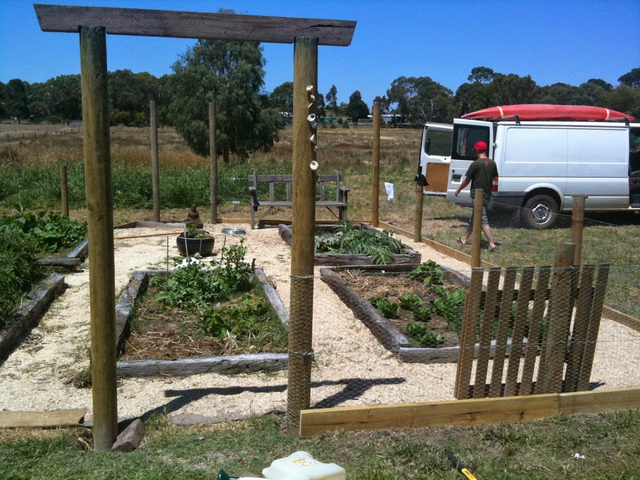
And of course we collect our own seeds as much as possible, and if not, buy organic heirloom seeds to increase biodiversity as much as possible. We plant for bees as well as ourselves. Lots of herbs for medicinal tinctures, teas and eating. We've also planted some two hundred native trees around the property which are starting to create a microclimate and more shade for both us, the plants and the birds. We hope that one day someone will look at this place and be glad we worked so hard to create it - even if we're not around to enjoy it, hopefully it'll create some food independence for them.
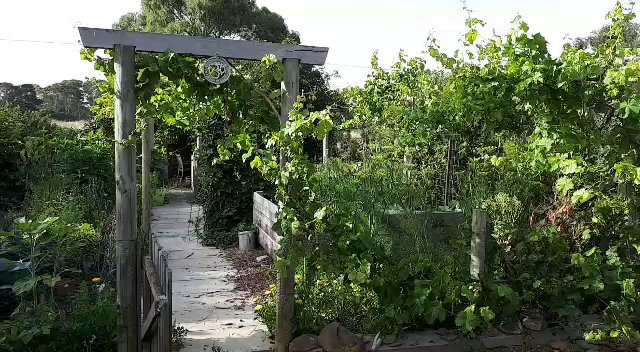
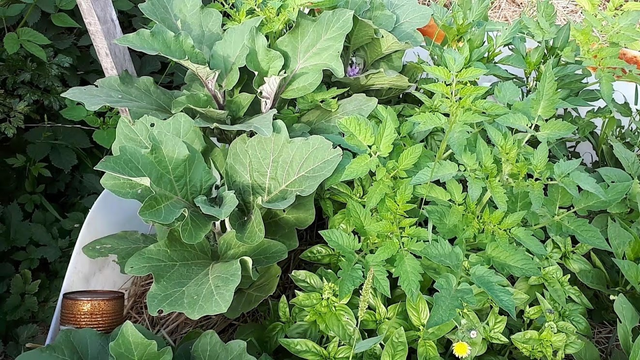
I'll end this post with @sagescrub's passage, framing his challenge to all Steemians. I think it sums it up really nicely, and the questions therein are now for you, dear reader, to also answer:
I hope that this challenge can inspire us to inspire each other, share knowledge, resources and solutions. Inform those that are un-informed. Help those that need help. I personally am so past complaining about our problems. I am past anger. I am ready for action and ready to make a difference in our world. How well can we tune our message? How far can we send our message? How many can we inspire to choose resilience?
It's so inspiring to see what you're doing for food sovereignty. And you know as much as I don't like fb either, I may have to start a group like that for our area along with @nateonsteemit.
Maybe be they could have the same names and be regional! There is a group here called the long spoon collective... maybe I'll join in. They hold food sharing events and build gardens in a workshop setting around town wherever someone wants to start growing their own food!
That garden of yours, what a difference fro. That first photo.
Thanks for sharing... now I want to try kangaroo!
What a great introduction to the farming history here. It's certainly something that needs to be re-evolved. I recently came across Peter Andrews and Natural Sequence Farming which I keep meaning to look into more. Have you come across him before? It looks promising if it can gain a bigger adoption.
I admire how much you've done to reach the community and bring them together. Finding that many people growing their own food in one area is good going. @ligayagardener has been doing a fair bit on similar things for his area.
Posted using Partiko Android
It's our area @minismallholding. We're all doing it together
Posted using Partiko Android
I'm a bit of a drive from you, though, and rarely make the Gawler swap meets. I'm not allowed to join the Buy Nothing Gawler group, to far away. :(
Posted using Partiko Android
Yes, I have heard about Peter Andrews!!!
he's amazing, there was an Australian story on him https://www.abc.net.au/austory/of-droughts-and-flooding-rains---part-1/9169558
@ligayagardener, are you SA as well??
That was back in 2005! I really hope they've been moving forward with this and haven't just tried to ignore it. I was reading recently about willows at a dam here and they are still saying they're bad for the waterways.
Posted using Partiko Android
At Gawler @riverflows. What about yourself?
Posted using Partiko Android
Victoria.. south of Melbourne..
Posted using Partiko Android
We'll catch up one day
Posted using Partiko Android
Half hour by car isn't too bad. You're ust in the sweet spot between Joe's Connected Garden and Ligayagarden. There's gardening whichever way you turn!
Posted using Partiko Android
This post was shared in the Curation Collective Discord community for curators, and upvoted and resteemed by the @c-squared community account after manual review.
@c-squared runs a community witness. Please consider using one of your witness votes on us here
Thankyou gorgeous xx
That was beautifully written and so inspiring! Thank you for sharing not just what you are doing, but the history that makes it so important. Good luck to you and your whole community. You seem to have the hard work part of the equation handled.
Thanks lovely! Appreciated.
Congratulations @riverflows! You have completed the following achievement on the Steem blockchain and have been rewarded with new badge(s) :
Click here to view your Board
If you no longer want to receive notifications, reply to this comment with the word
STOPFABULOUS article @riverflows.
What an achievement to start something that grows SO big that you have to step back a little ~ At the same time you can take so much pleasure and pride in the continuation of its growth in other ways.
Love the Food Swap and bartering practice you've been able to set up ~ I guess Facebook still comes in handy for initiating such a project. One day some of these people will realize that there ARE other places where they can come together.
The closest we come to being able to barter is with some of our stallholder friends at the local organic farmers market. We get some of our products a bit cheaper and then when I've made something like 'cacao balls' I give them to them. Like @sagescrub:
The transformation of your garden is inspirational. ♥︎♥︎⚖️♥︎♥︎
Thanks so much!!! Facebook does come in handy - it's just more socially accepted across all ages I think. It's the only good thing about Facebook, these community groups. May there be another way! I have told of communitys that do it all via emails and that works too. It's just easier for people to find you via Facebook.
I had no idea your garden was so Amazing @riverflows!! Wow! You have been busy planting! Really enjoyed the photos at the end. Its nice to hear perspective from an Australian and hear a bit of the history of agriculture with anecdotes. Its the same story as over here but with a different tune. I was so happy to learn about the success of your facebook group and the ability of people to provide surplus for each other. Woo! You are inspiring me big time :) Thank you for sharing what you are doing and why. I am definitely here for the dirt, seed and food revolution!
What, have you missed all my garden gushing posts? Lol.
Yes, there are definitely parellels between our two countries.
This poem also comes to mind - you might like it...
https://poeticresolution.wordpress.com/2012/09/30/the-machine-of-the-twentieth-century-rols-through-the-high-yielding-crop-by-john-kinsella/
I must have missed posts that have photos of the lushness of your garden.. I am sorry riverflows! I always knew you are a great gardener from your amazingly fresh food photos!
The poem is so good!! We definitely got good at being efficient. Pat on the back for that.
I will have to do a garden update just for.you!!!
Posted using Partiko Android
It's the problem with this one week lifespan for posts... People don't get to see or don't follow up on old posts because there's no return
Posted using Partiko Android
How wonderful!!!
Wow your garden and homestead has come a long way! Love that idea of having food swaps. I never thought of having an organized one like that before. We often trade amongst our neighbors when we have excess but I see that could be a valuable way to do it if there is a collapse and food is not available through the regular chains. We have a lot of gardeners and food producers in our neighborhood.
What a shame that the Europeans caused such destruction to your country and definitely it is time to adopt indigenous food cultivation, whether it can reverse it or not remains to be seen but it is certainly is a healthier way of food cultivation for both the people and the earth.
Thanks so much. Yes, technology can be great for that kind of thing!
This post is sponsored and featured by @Appreciator in collaboration with @c-squared. Just keep up the good work.
Thanks muchly.